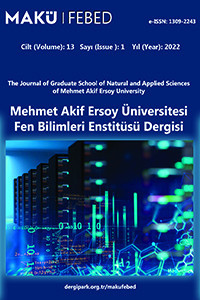Denetleyici ve düzenleyici sistemler konusunda uygulanan çoklu zekâ kuramının öğrencilerin başarısına etkisi
The aim of this study is to assess the effect of biology teaching based on multiple intelligence theory, on academic success of students. Study group was selected from 11th grade science students of Erzurum Hacı Sami Boydak Anadolu Lisesi in the 2008-2009 academic years. One group of students receiving classical teaching was chosen as control, while a second group receiving multiple intelligence theory based teaching was chosen as experiment group. Control System Success Test and Biology Behavior Scale were used to determine the effects of two different teaching strategies. The study comprised one week of pre-test, 4 weeks of teaching practice, and one week of post-test, 6 weeks in sum. Applications were made by the researcher. Numeric data obtained was assessed in SPSS. Statistical assessment was made by independent variables t-test. Results suggest that multiple intelligence based teaching was more effective that classical teaching methods in Control and Regulatory Systems subject.
Anahtar Kelimeler:
Multiple Intelligenge Theory, Education, Traditional education.
Effect of multiple intelligence theory applied for control and regulatory systems on student success
The aim of this study is to assess the effect of biology teaching based on multiple intelligence theory, on academic success of students. Study group was selected from 11th grade science students of Erzurum Hacı Sami Boydak Anadolu Lisesi in the 2008-2009 academic years. One group of students receiving classical teaching was chosen as control, while a second group receiving multiple intelligence theory based teaching was chosen as experiment group. Control System Success Test and Biology Behavior Scale were used to determine the effects of two different teaching strategies. The study comprised one week of pre-test, 4 weeks of teaching practice, and one week of post-test, 6 weeks in sum. Applications were made by the researcher. Numeric data obtained was assessed in SPSS. Statistical assessment was made by independent variables t-test. Results suggest that multiple intelligence based teaching was more effective that classical teaching methods in Control and Regulatory Systems subject.
Keywords:
Multiple Intelligenge Theory, Education, Traditional education.,
___
- Arsmtrong, T. (1994). Multiple intelligences in the cîassroom. Virginia: Association for Super and Curriculum Development.
- Aşçı, Z. & Demricioğlu, D, (2002). “Çoklu Zeka Temelli Öğretim Dokuzuncu SınıfÖğrencilerinin Ekoloji Başarısına, Ekoloji Tutumlarına ve Çoklu Zekâlarına Etkisi”.Yayımlanmamış yüksek lisans tezi, ODTÜ Eğitim Fakültesi, Ankara.
- Azar, A., Presley, A.İ., & Baklaya, Ö. (2006). Çoklu Zekâ Kuramına Dayalı Öğretimin Öğrencilerin Başarı, Tutum, Hatırlama ve Bilişsel Süreç Becerilerine Etkisi. Hacettepe Üniversitesi, Eğitim Fakültesi Dergisi, 30, 45-54.
- Baykal, A. İ. (2005). “Sosyal Bilgiler Dersinde Uygulanan Çoklu Zeka Kuramının Öğrencilerin Akademik Başarılarına Etkileri”. Yayımlanmamış yüksek lisans tezi, Gazi Üniversitesi, Eğitim Bilimleri Enstitüsü, Ankara.
- Blythe, T., & Gardner, H. (1990). A School for all intelligence. Educationa Leadership, 47, 7, 33-37.
- Campbell, B. (1992). Multiple intelligences in action. Childhood Education, 68(4), 197-200.
- Canoğlu, İ. (2004). Eğitim Teknolojilerinden Yararlanarak Çoklu Zeka Öğretimde Kullanımı Üzerine Bir Uyguluma. The Turkish Online Journal of Educational Technology-TOJET, 3( 4), 1303-6521.
- Demirel, Ö., Tuncel, İ., Demirhan, C., & Demir, K. (2008). Çoklu Zekâ Kuramı İle Disiplinlerarası Yaklaşımı Temel Alan Uygulamalara İlişkin Öğretmen-Öğrenci Görüşleri. Eğitim ve Bilim, 33, 147, 14-25.
- Demirel, Ö. (2000). Planlamadan Uygulamaya Öğretme Sanatı. Pagem A Yayıncılık, Ankara.
- Demirel, Ö. (1998). İlköğretimde Çoklu Zeka Kuramının Uygulanması. VII. Ulusal Eğitim Bilimleri Kongresi, Konya Selçuk Üniversitesi, Konya.
- Dilli, R. (2003). Çoklu Zeka Kuramanın Sanat Eğitimi Derslerinde Kullanımı. Yayımlanmamış yüksek lisans tezi, Gazi Üniversitesi,Eğitim Bilimleri Enstitüsü, Ankara.
- Gardner, H. (1983). Frames of mind the theory of multiple intelligences. New York: Basic Boks.
- Gardner, H. (1999). Cracking open the ıq box. The American Prospect.
- Goodnough, K. (2001). Multiple intelligences theory: A framevvork for personalizing science curricula. School, Science and Mathematics.
- Greenhawk, J. (1997). Multiple ıntelligences meet standards. Educational Leadership, 55(1), 62-64.
- Gürbüz, R. (2008). Matematik Öğretiminde Çoklu Zekâ Kuramına Göre Tasarlanan Öğrenme Ortamlarından Yansımalar. Yayımlanmamış doktora tezi, Karadeniz Teknik Üniversitesi, Fen Bilimleri Enstitüsü, Trabzon.
- Kaya, O. N. (2002). İlköğretim 7.Sınıf Öğrencilerinin Atom Ve Atomik Yapı Konusunda Başarılarına, Öğrendikleri: Bilgilerin Kalıcılığına, Tutum Ve Algılamalarına Çoklu Zekâ Kuramının Etkisi. Yayımlanmamış yüksek lisans tezi , Gazi Üniversitesi, Eğitim Bilimleri Enstitüsü, Ankara..
- Kılıç, Ç. (2002). Çoklu Zeka Kuramının Amerikan Okullarındaki Uygulamaları Üzerine Ulusal Bir Çalışma (SUMİT Projesi). Eğitim Araştırmaları,8, 165-174.
- Koballa, T.R. (1988).“Attitude and related concepts in science education”. Science Education, 72, 115.
- Köksal, M. S., & Yel, M. (2007). The effect of multiple ıntelligences theory (mıt)-based ınstruction on attitudes towards the course, academic success, and performance of teaching on the topic of “respiratory systems”. Educational Sciences: Theory & Practice, 7, 231-239.
- Kurtçuoğlu, S. (2007). Lise 11. Sınıf Biyoloji Dersi Sindirim Sistemi KonusundaUygulanan Çoklu Zeka Kuramının Öğrencilerin Başarılarılarına Etkisi.Yayımlanmamış yüksek lisans tezi, Gazi Ünivesitesi, Eğitim Bilimleri Enstitüsü, Ankara.
- Lazear, D. (1992). Teaching for multiple ıntelligences. Bloomington, IN: Phi Delta Kappa Education Foundation.
- Özatlı, N. (2006). Öğrencilerin Biyolojide Zor Algıladıkları Konuların Tespiti ve Bilişsel Yapılarının Yeni Tekniklerle Ortaya Konması. Yayımlanmamış doktora tezi, Balıkesir Üniversitesi.Balıkesir.
- Saban, A. (2002). Çoklu Zeka Teorisi Ve Eğitim. Nobel Yayın Dağıtım, Ankara.
- Schibeci, R. A. (1984). “Attitudes to science: An update”. Studies in Science Education, 11, 26.
- Türkuzan, R. (2004). Çoklu Zeka Kuramının Lise 1. Sınıf Öğrencilerinin Öz Kütle Konusu Anlamalarına Ve Öğrendikleri Bilgilerin Kalıcılığına Etkisi. Yayımlanmamış yüksek lisans tezi. Gazi Üniversitesi, Eğitim Bilimleri Enstitüsü, Ankara.
- Yayın Aralığı: Yılda 2 Sayı
- Başlangıç: 2010
- Yayıncı: Burdur Mehmet Akif Ersoy Üniversitesi
Sayıdaki Diğer Makaleler
Hasan GENÇ, Huriye DENİŞ, Hilmi DEMİRKAYA
İlköğretim öğrencilerinin ormana ilişkin görüşleri: Nitel bir araştırma
Hasan GENÇ, Hilmi DEMİRKAYA, Gülşah KARASAKAL
Murat KURT, İbrahim GÜMÜŞ, Aysel TEMELLİ
Hava kirliliğinin belirlenmesinde likenlerin kullanımı
Özge TUFAN-ÇETİN, Hüseyin SÜMBÜL
Balık yemlerinde alternatif bitkisel protein kaynağı olarak fındık küspesi kullanımı
